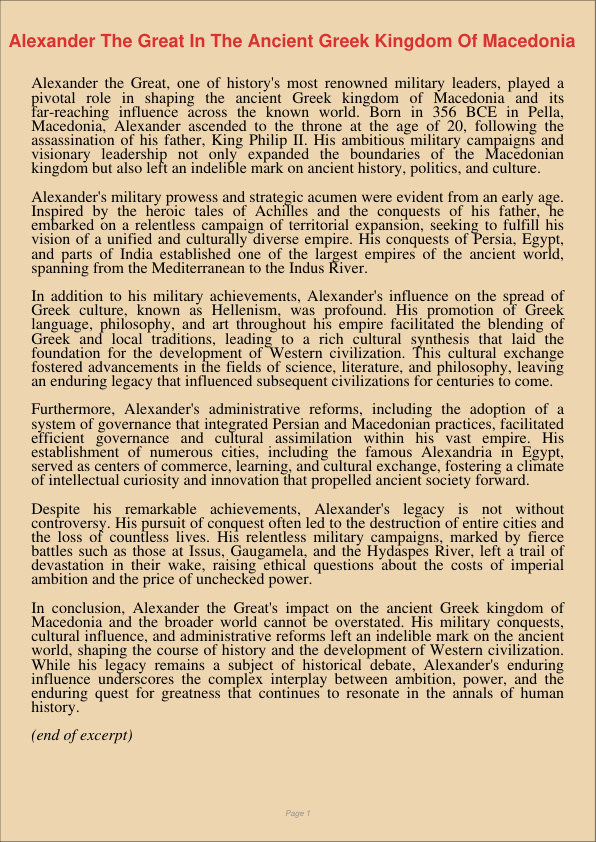Alexander The Great In The Ancient Greek Kingdom Of Macedonia
Dec 31, 2023
ancient greek kingdom
macedonia
Law
English

Alexander the Great, one of history’s most renowned military leaders, played a pivotal role in shaping the ancient Greek kingdom of Macedonia and its far-reaching influence across the known world. Born in 356 BCE in Pella, Macedonia, Alexander ascended to the throne at the age of 20, following the assassination of his father, King Philip II. His ambitious military campaigns and visionary leadership not only expanded the boundaries of the Macedonian kingdom but also left an indelible mark on ancient history, politics, and culture.
Alexander’s military prowess and strategic acumen were evident from an early age. Inspired by the heroic tales of Achilles and the conquests of his father, he embarked on a relentless campaign of territorial expansion, seeking to fulfill his vision of a unified and culturally diverse empire. His conquests of Persia, Egypt, and parts of India established one of the largest empires of the ancient world, spanning from the Mediterranean to the Indus River.
In addition to his military achievements, Alexander’s influence on the spread of Greek culture, known as Hellenism, was profound. His promotion of Greek language, philosophy, and art throughout his empire facilitated the blending of Greek and local traditions, leading to a rich cultural synthesis that laid the foundation for the development of Western civilization. This cultural exchange fostered advancements in the fields of science, literature, and philosophy, leaving an enduring legacy that influenced subsequent civilizations for centuries to come.
Furthermore, Alexander’s administrative reforms, including the adoption of a system of governance that integrated Persian and Macedonian practices, facilitated efficient governance and cultural assimilation within his vast empire. His establishment of numerous cities, including the famous Alexandria in Egypt, served as centers of commerce, learning, and cultural exchange, fostering a climate of intellectual curiosity and innovation that propelled ancient society forward.
Despite his remarkable achievements, Alexander’s legacy is not without controversy. His pursuit of conquest often led to the destruction of entire cities and the loss of countless lives. His relentless military campaigns, marked by fierce battles such as those at Issus, Gaugamela, and the Hydaspes River, left a trail of devastation in their wake, raising ethical questions about the costs of imperial ambition and the price of unchecked power.
In conclusion, Alexander the Great’s impact on the ancient Greek kingdom of Macedonia and the broader world cannot be overstated. His military conquests, cultural influence, and administrative reforms left an indelible mark on the ancient world, shaping the course of history and the development of Western civilization. While his legacy remains a subject of historical debate, Alexander’s enduring influence underscores the complex interplay between ambition, power, and the enduring quest for greatness that continues to resonate in the annals of human history.